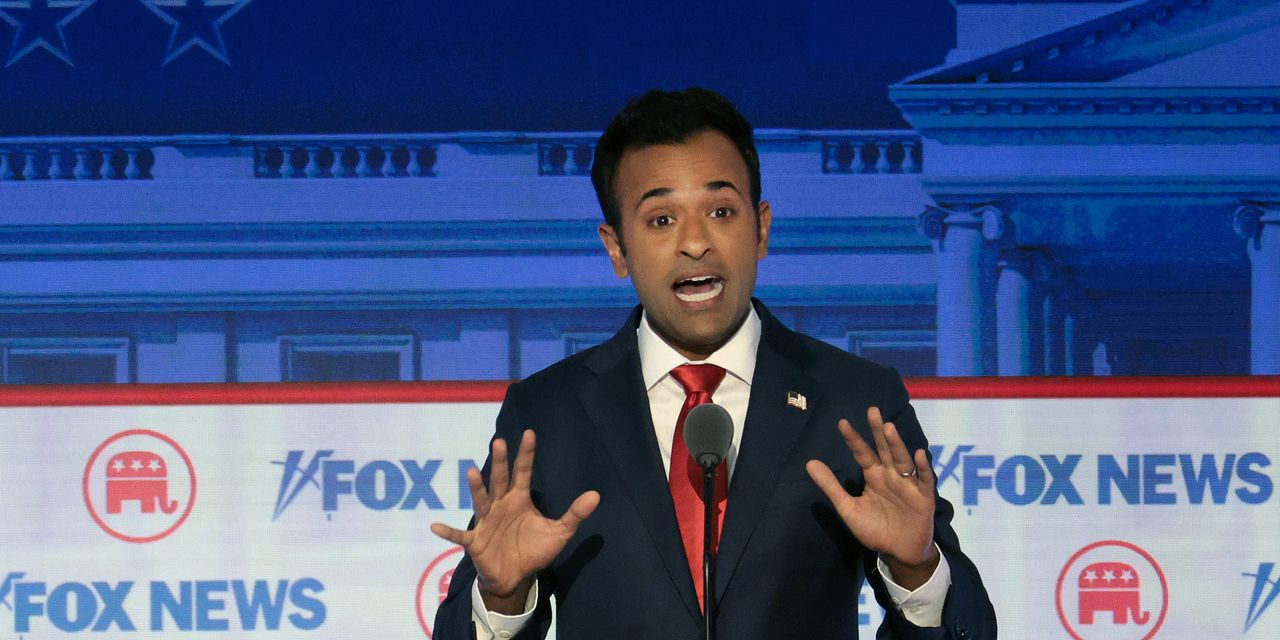“‘Let us be honest as Republicans — I’m the only person on the stage who isn’t bought and paid for, so I can say this — the climate-change agenda is a hoax.’”
Moderators broached the subject of climate change early in Wednesday’s Republican debate. The topic ruffled the debaters and offered a glimpse at oratory styles out of the gate, but as a major policy point, climate change disappeared pretty quickly from the evening’s discussion.
At least one candidate, the private sector’s Vivek Ramaswamy, who has been gaining ground in polls, capitalized on the moment to repeat his view that climate change — or as he said Wednesday night, “the climate-change agenda”— is a “hoax.”
Polling front-runner former President Trump has also claimed climate change is a “hoax” in several past instances. He was not a participant in Wednesday night’s debate but sat for a one-on-one interview as counter programming.
Read: Republican presidential debate: Haley impresses, as Pence, Ramaswamy also score points
Related: Christie says Ramaswamy sounds like ChatGPT, Obama
The Fox Television hosts pointed to this summer’s Canadian and Hawaiian wildfires and the extreme heat blanketing the middle of the country on debate day. They also showed a video clip from a young conservative who wondered how the candidates would address climate change given its relevance with voters in that age cohort.
Specifically, the eight participating candidates were asked whether humans had contributed to climate change. And despite reams of scientific study and concerns from major public health groups focused on the speed of global warming since the modern industrial age, hardly any of the Republican candidates gave a straight answer.
“Let us be honest as Republicans — I’m the only person on the stage who isn’t bought and paid for, so I can say this — the climate change agenda is a hoax,” said Ramaswamy, who notably leveraged science as a millionaire biotech entrepreneur.
“And so the reality is more people are dying of bad climate change policies than they are of actual climate change,” he added without further elaboration.
Candidate Nikki Haley, the former South Carolina governor and United Nations ambassador under Trump, sought to reset the focus on climate change after rival Chris Christie, the former New Jersey governor, had pivoted to Ramaswamy’s style.
“Is climate change real?” Haley said. “Yes, it is. But if you want to go and really change the environment, then we need to start telling China and India that they have to lower their emissions.” The U.S., China and India are the globe’s top three polluters of atmosphere-warming greenhouse gases.
Center-right energy policy group Citizens for Responsible Energy Solutions (CRES) thought not all was lost when it came to climate change and energy policy in Wednesday night’s debate, particularly remarks on U.S.-generated energy sources. CRES and its stakeholders have historically promoted domestic natural gas production and largely private-sector investment in solar, wind and other renewables to create a diverse and secure U.S. energy portfolio.
“ ‘Is climate change real? Yes, it is. But if you want to go and really change the environment, then we need to start telling China and India that they have to lower their emissions.’”
GOP candidates call for increased domestic energy production, with former Vice President Mike Pence hailing the Trump administration he served in as “unleash[ing] American energy” and Ramaswamy saying the U.S. must “drill, frack, burn coal, unleash nuclear.”
Read: How will energy, climate change and EVs feature in the first Republican debate?
“Any Republican presidential candidate who wants to be taken seriously must acknowledge climate change and outline their plan to promote affordable, reliable and clean American energy,” CRES President Heather Reams told MarketWatch.
North Dakota Gov. and 2024 Republican presidential candidate Doug Burgum has pushed for his state to become carbon neutral by 2030 and touted the state’s $42 billion oil and gas industry. Burgum has said that as president he would back an all-of-the-above U.S. energy approach that includes alternative and traditional fuels. That includes boosting technology for carbon capture, a process to grab fossil-fuel emissions before they rise into the atmosphere, and another approach that “vacuums” existing emissions from the air.
Related: Climate change and carbon capture: Texas, Louisiana score federal money for largest-ever U.S. direct-air effort
GOP candidates who, in the past, have explicitly said they would leave the Paris climate agreement that guides global policy include Ramaswamy, Haley and Pence. (What is the Paris climate agreement?)
The Biden administration quickly returned the U.S. to the voluntary Paris accord of 2015, after the Trump administration had voided U.S. membership.
Climate change could return to the debate format in the future of course, and is likely to feature in two-party faceoffs. Biden’s team loaded the spending bill known as the Inflation Reduction Act with climate-thinking initiatives such as tax sweeteners for renewable energy
ICLN,
a switch to lower-emission appliances and solar panels, and actions to reduce the sticker prices of qualifying electric vehicles
TSLA,
Biden has also irked select climate-policy groups with moves like the approval of oil
CL00,
and gas
NG00,
leasing in the Gulf of Mexico and the go-ahead on the ConocoPhillips-operated
COP,
Willow Project, a massive Alaskan oil drilling site.
Read the full article here








